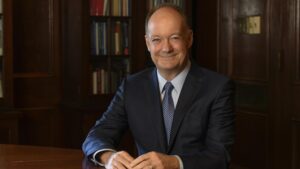The GUSA senate unanimously passed a resolution urging Georgetown to create a memorial to the 272 enslaved people sold by the university in 1838 at its Nov. 11 meeting. The resolution also asked all administrators, faculty, and students to read the 2016 report authored by the Working Group on Slavery, Memory, and Reconciliation.
The resolution calls for the Georgetown community to continue to work in support of the 272 by demanding the university enact more of the recommendations made by the working group and urging University President John DeGioia to create a memorial to the 272.
“We ACKNOWLEDGE that Georgetown University’s relationship with slavery has left an indelible legacy, but we HOPE that our University can make progress in establishing a new legacy—one of memorialization, reconciliation, and reparation,” the resolution reads.
GUSA Sen. Sam Appel (COL ’20) introduced the resolution, and wrote in an email to the Voice that GUSA is concerned that the university’s progress on the issue has slowed.
“It has been more than two years since the working group wrote its thorough, thoughtful report, with clear recommendations and brilliant explanations for why we cannot wait, and yet there are many that have gone unfulfilled—especially the recommendations related to memorializing and remembering the 272 human beings sold by Georgetown in 1838. One motivation, though there are others, for the petition and resolution is that students have become the ones following President DeGioia’s words and the working group’s report,” Appel wrote.
Mélisande Short-Colomb (COL ’21), a descendant of one of the 272, helped present the resolution. Short-Colomb feels that it is the responsibility of students to change the culture of the university.
“You know John Carroll. John Carroll is in the circle. Everybody knows the fight song. Everybody knows the wonderful history of the Jesuits. What you don’t know as students is that the Jesuits sold people so we could have all this,” Short-Colomb said.
Georgetown’s history with slavery has been a major topic on campus since 2015, when DeGioia sent an email inviting Georgetown to reflect on that history and make an effort to consciously move forward. One month later he announced the beginning of the Working Group on Slavery, Memory, and Reconciliation.
The recommendations of the group included changing the names of the former Mulledy and McSherry Halls due to the fact that their namesakes were involved in the possession and sale of slaves by the university. Other recommendations included offering an apology, connecting with descendents, creating memorials, creating an institute for the study of slavery and its legacies at Georgetown, and investing in diversity on campus.
Soon after the report, the university changed the names of the buildings to Freedom and Remembrance Halls, and then to Isaac Hawkins and Anne Marie Becraft Halls, and DeGioia offered a public apology to descendents of the 272. Since then, there have been efforts to connect with descendents, and there have been discussions surrounding an institute, but no memorial has been erected.
Appel feels the university is ignoring the community’s wishes for further action on the matter, and that the student body as a whole supports action. A petition was circulated among students asking GUSA to pass the resolution. “I think the fact that the petition obtained 235 signatures in the span of 48 hours speaks for itself,” Appel wrote. “I just hope the school listens.”
Fax Victor (COL ’19) feels the continuation of efforts surrounding 272 is up to the students. “If we don’t push for it the university is going to suffer from amnesia,” Victor said. He designed a memorial to honor the 272, and has offered to use his family’s company to create it and donate it to the university, though he does not think his design will be the final product. He mainly designed it to show what an appropriate memorial would look like, and encourage university action.
“If I could do it and show Georgetown what I could do then I think that would encourage them to make a grander memorial,” Victor said.
Victor expressed a growing concern that the university will forget about the 272 project entirely. When he has reached out to them, he says they have asked him to have patience, and that nothing should be done at this time. He is skeptical that the university is making progress on reaching out to the descendents. He said that everyone he has asked, including the descendents of the 272 who currently attend the university and the GU 272 Association, support the memorial he designed, but the university has still taken no action.
This concern is mirrored in the resolution, which alleges that Georgetown’s statements on the progress of the working group’s recommendations do not equate to action. Short-Colomb echoed this concern. “If they wanted to do anything, they would have done it in three years,”she said.
University spokesperson Meghan Dubyak wrote in an email to the Voice that the university is continuing to work on the issue. “We are working to ensure that steps taken by the University are conducted in consultation with the Descendant community,” Dubyak wrote.
“We appreciate the engagement and support of students and GUSA and look forward to consulting with students and other members of the university community as we work in partnership with Descendants on a process that recognizes the terrible legacy of slavery and promotes racial justice.” Dubyak did not provide any specific information as to what steps they are currently taking to advance the project.
Ultimately, advocates for the resolution simply want recognition. “Y’all don’t have to be ashamed of it, but you do have to know it,” Short-Colomb said.
At the same meeting, the senate unanimously passed a resolution encouraging all student groups on campus to sign and adhere to the plastic free pledge. The pledge includes a training session, avoiding disposables, opting for paper or compostable options, and reusing items.
The senate also confirmed the executive nomination of Grant Olson (COL ’19) to the Georgetown Community Partnership- Safety and Student Life committee.
The GUSA senate will meet next on Nov. 18 at 5 pm in Healy 106.





